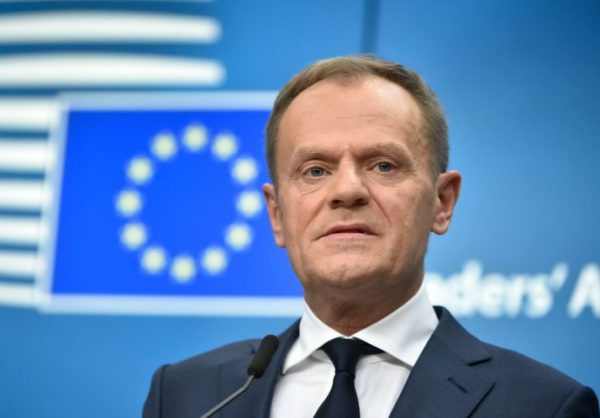
BRUSSELS — Even by the stressed standards of relations between Europe and the United States in the Trump era, European Council President Donald Tusk’s Wednesday criticisms were unusually cutting.
At the outset of a summit of European leaders whose agenda items, point by point, have to do with the flames of crises that many Europeans see as ignited by President Trump, Tusk ripped into what he called “the capricious assertiveness of the American administration” over issues including Iran, Gaza, trade tariffs and North Korea.
In comments to reporters and a subsequent tweet, he suggested the White House had lost touch with reality. He said Europe didn’t need enemies when it had friends like the United States. And he exhorted European leaders not to be reliant on Washington.
Just 16 months ago, such comments would have been unimaginable coming from an E.U. leader, whose continent modeled itself on the U.S. image in the aftermath of World War II. But Europeans are increasingly exasperated by the way Trump is steering U.S. policy, objecting not only to his stances but also to what they say is erratic policymaking that switches on the whim of Fox News programmers. The shifting desires make it nearly impossible to negotiate with the White House, many diplomats say, because they cannot strike a bargain to get close to what Trump wants when he doesn’t know it himself.
Tusk, a former prime minister of Poland who now presides over one branch of E.U. policymaking, went full zen in his angry description of Trump’s effect on Europe.
“Looking at the latest decisions of Donald Trump, someone could even think: With friends like that, who needs enemies?” Tusk told reporters in English ahead of a summit in Sofia, Bulgaria. “But, frankly speaking, Europe should be grateful by President Trump. Because, thanks to him, we got rid of all the illusions. He has made us realize that if you need a helping hand, you will find one at the end of your arm.”
European leaders have scrambled to salvage the 2015 agreement in which Iran agreed to halt its nuclear program, a landmark deal that many Europeans see as essential for their security. Leaders on Wednesday plan to discuss whether to direct E.U. businesses to defy U.S. sanctions against Iran, an unusual measure with uncertain chances of success that would nevertheless be a diplomatic blow to Washington.
That came a day after many European newspapers featured dueling photographs on their front pages: the beaming visage of first daughter Ivanka Trump opening the new U.S. Embassy in Jerusalem, and the smoky carnage an hour’s drive away in Gaza, where scores of Palestinian protesters were killed by the Israeli military. The contrast has stirred up even more European anger toward Trump’s foreign policy, and the Gaza violence is another mark on the agenda for European leaders to discuss during their day and a half of meetings that starts Wednesday.
Tusk’s public comments on Wednesday also touched on the new U.S. tariffs on steel and aluminum that are set to bite on June 1 unless Trump grants a reprieve. E.U. negotiators have said that as one of the closest trading partners of the United States, they will not make concessions with a gun to their head. There appears to have been little progress in those discussions. Tusk said Europe planned to stand its ground.
“We need to bring reality back to this discussion, which is not the case today,” he said.


Leave a Reply
You must be logged in to post a comment.